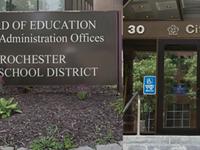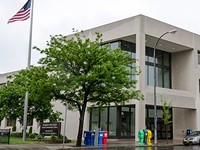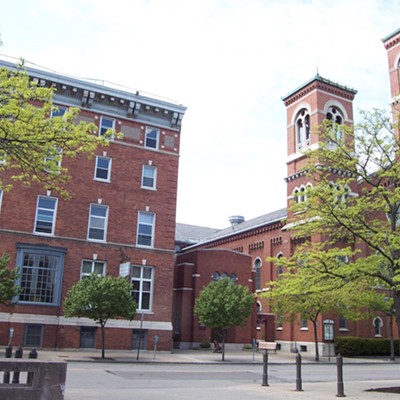[
{
"name": "500x250 Ad",
"insertPoint": "5",
"component": "15667920",
"parentWrapperClass": "",
"requiredCountToDisplay": "1"
}
]
Here we go again.
Rochester school district officials may consider creating middle schools, something we tried a few decades ago and then mostly abandoned. As the Democrat and Chronicle reported last week, the idea is part of a proposed Rochester teachers contract now under discussion. The teachers union wants the district to separate seventh- and eighth-graders from other students - in part, to help deal with student behavior problems.
Separate schools for those ages may be a good idea. But teachers union president Adam Urbanski adds a qualifier: they have to be small schools. "No more than 400 students," he told the D&C.
School board members say they'll study the idea. But according to the D&C article, Urbanski's idea would require creating 15 middle schools. Can the district afford that?
Obviously, the district must solve the student-behavior problem. But look for the roots of that problem, and you find, among other issues, poverty and its concentration. Not surprisingly, the same is true of the district's test scores and graduation rate. They're all of a piece.
We keep trying to fix the problems in Rochester schools, but none of the fixes address the cause. Dealing with the concentration of poverty - finding a way for poor children to attend non-poverty schools - seems too hard and too controversial. So we don't even try. And we are ruining the future for many of Rochester's children.
One positive, of course, is the Urban Suburban program, which lets city students attend schools in the 13 participating suburban districts. It's an important program, but it serves only a small minority of Rochester's students. And it attacks concentrated poverty by taking students out of the city.
Meanwhile, achievement in most city schools remains tragically low. And middle-and upper-income families flee. Lack of public faith in Rochester's schools is hurting the city itself, and it will be a drag on the city's efforts to attract new residents and new employers.
The school district has to start attracting middle- and upper-income families. So let me suggest something that might do that: create academically competitive schools. And let me point to a city that could be a model: Chicago, where all three of my grandchildren are thriving in public schools.
Chicago has some of the lowest-performing public schools in Illinois. It also has several of the top-performing schools. My oldest grandson attends one of them: Walter Payton College Prep. Consistently included on US News' national top-schools list, Payton offers classes and extra-curricular activities that rival a private school's. Most of its students graduate and go on to college.
And its student body is 63 percent minority - and 32 percent poor.
Yes, students must score well on entrance tests, and I think the testing is too intense. Besides, not all bright students test well. But it's possible to create schools for bright students - of all races and incomes - without relying on high-pressure testing.
The key is to keep the poverty rate low. We need to create schools where children of all races and income levels do well - and I don't think we can do that in a high-poverty school. (Charter schools may eventually prove me wrong; so far, though, their overall record isn't great.)
Does an academically competitive school discriminate against black and Hispanic children? Not unless we believe that only white children are bright, that only white children have families who want them to do well. Rochester's Urban-Suburban program is just one proof that that's not the case.
Plenty of studies show that children in high-poverty schools do poorly - and that poor children attending low-poverty schools do better and have a better chance at success in life. Rochester continues to try to prove those studies wrong, and we continue to fail.
Creating middle schools - small middle schools - may be a good idea, for a lot of reasons. But it doesn't address the district's achievement problem. Creating competitive schools, on the other hand, could. And it could keep middle- and upper-income families in the city and attract new ones.
Speaking of...
Latest in Urban Journal
More by Mary Anna Towler
-

Police reform: advocates on what should come next
Oct 22, 2019 -

Court clears the way for Police Accountability referendum
Oct 17, 2019 -

Dade outlines initial actions on district deficit
Oct 9, 2019 - More »









